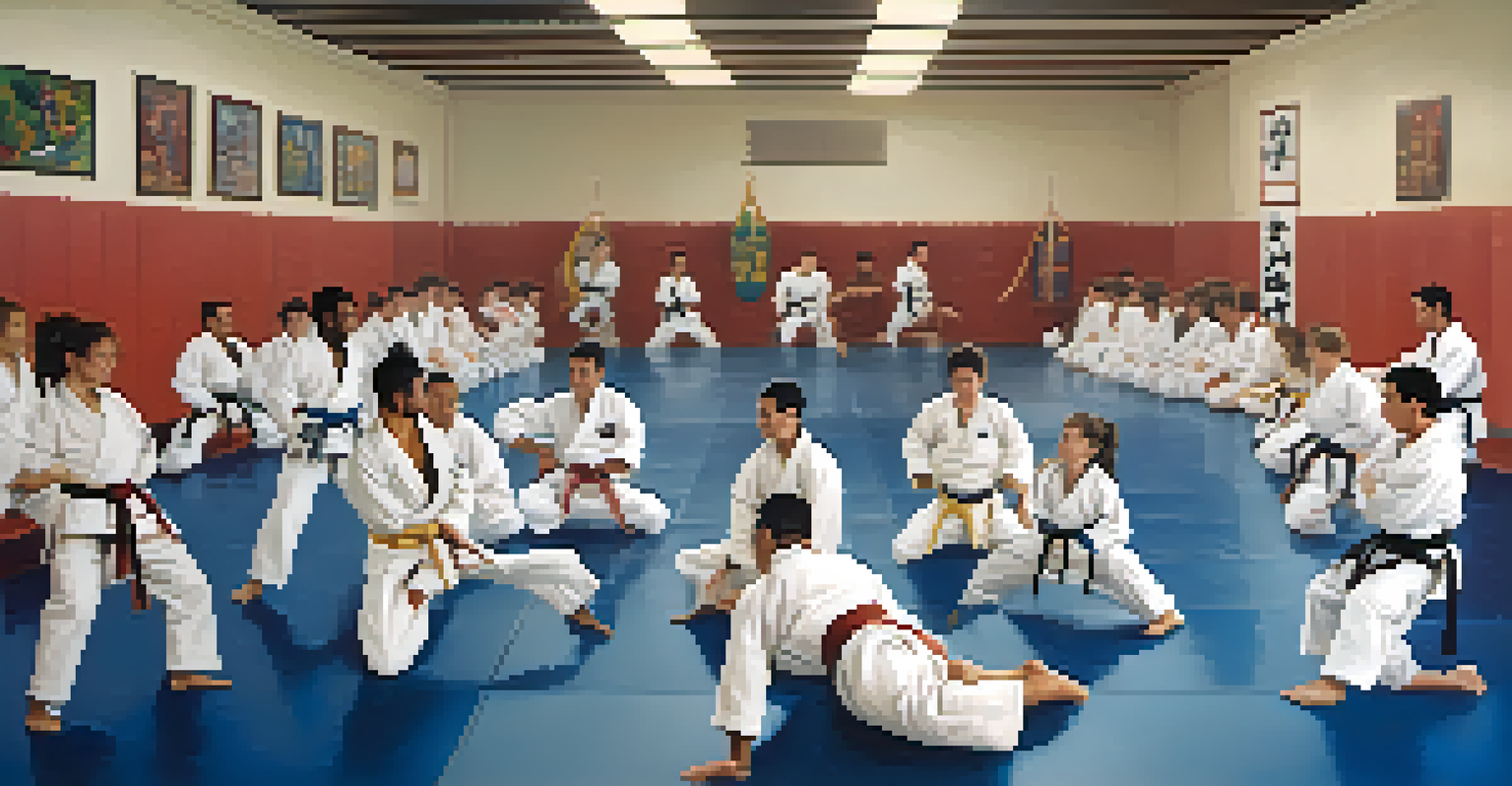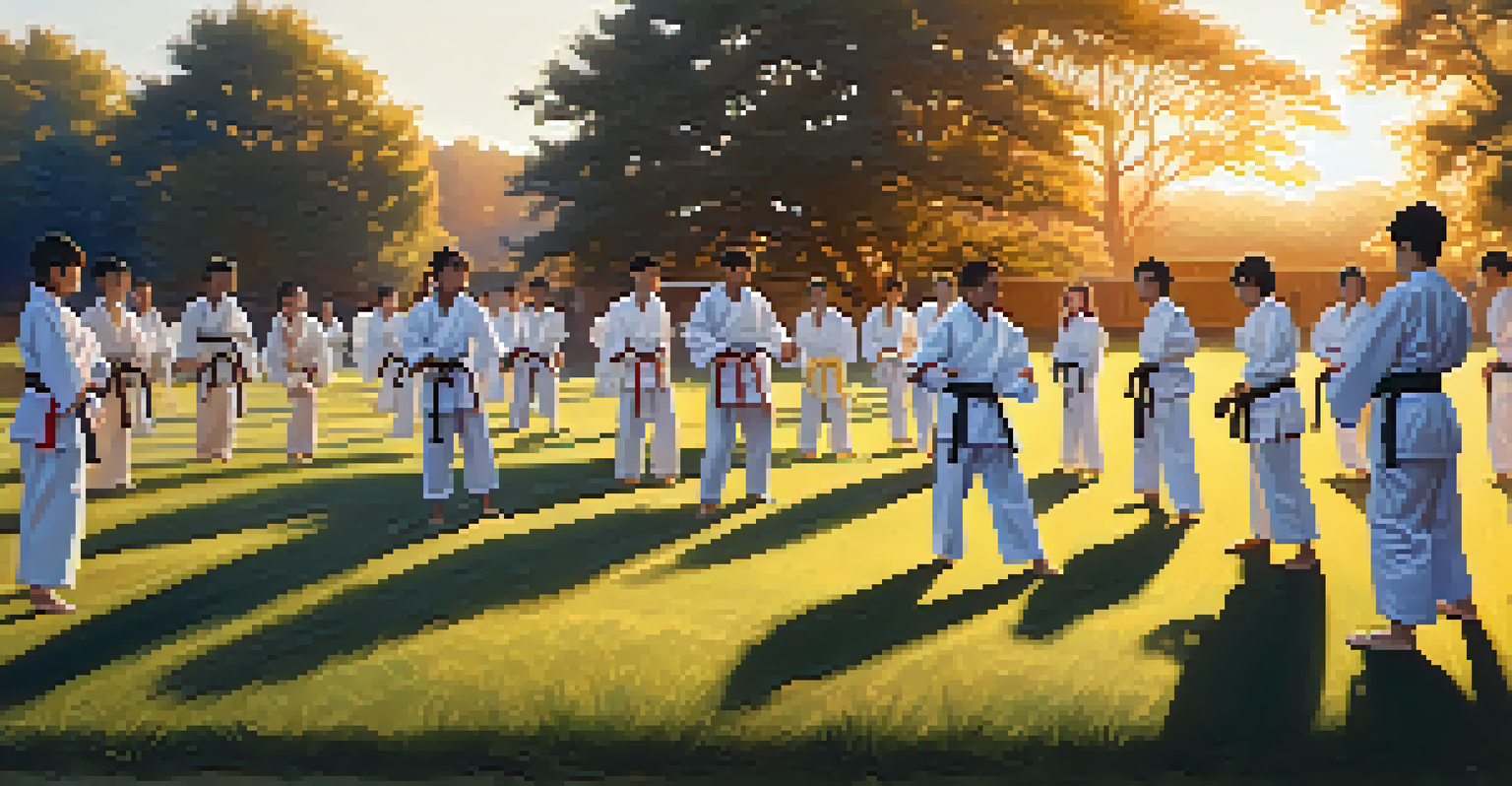How Martial Arts Cultivate Mental Toughness and Resilience

Understanding Mental Toughness in Martial Arts
Mental toughness is the ability to stay focused and resilient under pressure. In martial arts, practitioners face physical challenges that also test their mental fortitude. This dual challenge creates a unique environment where individuals learn to push beyond their limits.
The greatest glory in living lies not in never falling, but in rising every time we fall.
For instance, a karate student might struggle with a difficult kata. This experience teaches them not just how to execute the moves but also how to cope with frustration and setbacks. Over time, they develop a mindset that embraces challenges rather than shies away from them.
Ultimately, mental toughness in martial arts translates to everyday life, helping individuals tackle stress and adversity with greater confidence and poise.
The Role of Discipline in Training
Discipline is a cornerstone of martial arts training, requiring consistent practice and dedication. This commitment fosters resilience as students learn to show up even when they don't feel like it. The repetition of drills and techniques instills a sense of responsibility towards personal growth.

Take, for example, a jiu-jitsu practitioner who practices their moves daily. Each session, regardless of their mood, reinforces the idea that discipline leads to improvement. This lesson extends beyond the dojo, encouraging individuals to adopt disciplined habits in their daily lives.
Mental Toughness Transforms Lives
Practicing martial arts builds mental resilience, helping individuals manage stress and overcome challenges in everyday life.
As a result, the discipline learned in martial arts cultivates a strong work ethic, equipping practitioners to face life's challenges head-on.
Facing Fear and Overcoming Anxiety
Martial arts training often involves facing fears, whether it's sparring against a partner or performing in front of an audience. This confrontation helps students learn how to manage anxiety and develop coping strategies. Each time they step onto the mat, they confront their fears and emerge stronger.
Success is not final, failure is not fatal: It is the courage to continue that counts.
Consider a student preparing for their first tournament. The nervous anticipation can be overwhelming, but through preparation and support, they learn to channel that energy into performance. Each match becomes a stepping stone toward becoming more comfortable in high-pressure situations.
This ability to face fear not only builds resilience in martial arts but also translates to better handling of everyday anxiety, empowering individuals to tackle challenges with a calm mindset.
Setting and Achieving Goals
Goal-setting is integral to martial arts, with practitioners constantly striving for new belts or mastering techniques. This process teaches individuals how to set realistic goals, stay motivated, and celebrate progress. Each achievement, no matter how small, reinforces the idea that perseverance pays off.
For instance, a taekwondo student may aim to earn their green belt. The journey involves consistent training, self-reflection, and overcoming obstacles. Achieving this goal instills a sense of accomplishment and fosters an appreciation for the effort invested.
Discipline Fuels Personal Growth
Consistent training in martial arts instills discipline, promoting a strong work ethic that translates to various aspects of life.
The skills learned in goal-setting within martial arts can be applied in various areas of life, encouraging individuals to pursue their aspirations with resilience and determination.
Building Confidence Through Practice
Regular practice in martial arts builds confidence in one's abilities. As students master techniques and improve their skills, they gain a sense of competence that enhances their self-esteem. This newfound confidence becomes a powerful tool in managing life’s challenges.
Imagine a student who initially struggles with a kick but, through practice and guidance, eventually executes it flawlessly. This transformation not only boosts their confidence in martial arts but also spills over into their daily interactions and decision-making.
Thus, martial arts serve as a platform for individuals to grow in self-assurance, empowering them to take on new challenges with a positive mindset.
Learning from Failure and Setbacks
Failure is an inevitable part of martial arts training, whether it's losing a match or failing to perform a technique correctly. However, these setbacks are viewed as valuable learning opportunities. Practitioners learn to analyze their mistakes, adapt, and return stronger than before.
For example, a student who loses a sparring match can reflect on their performance. Instead of feeling defeated, they can identify areas for improvement and approach their next training session with renewed focus. This resilience in the face of failure is a crucial life lesson.
Community Strengthens Resilience
The supportive environment in martial arts fosters connections that enhance emotional well-being and provide motivation during tough times.
By embracing failure as a stepping stone to success, martial artists cultivate a growth mindset that carries into all aspects of their lives.
The Community Support in Martial Arts
Martial arts often foster a sense of community and support among practitioners. This network provides encouragement during tough times, reinforcing resilience through shared experiences. The bonds formed can help individuals navigate personal challenges more effectively.
For instance, a student who struggles with self-doubt may find solace in their classmates’ encouragement. Their dojo becomes a safe space where they can express vulnerabilities while receiving support and motivation from peers and instructors.

This community aspect not only enhances the martial arts experience but also instills a sense of belonging, which is vital for mental and emotional resilience.